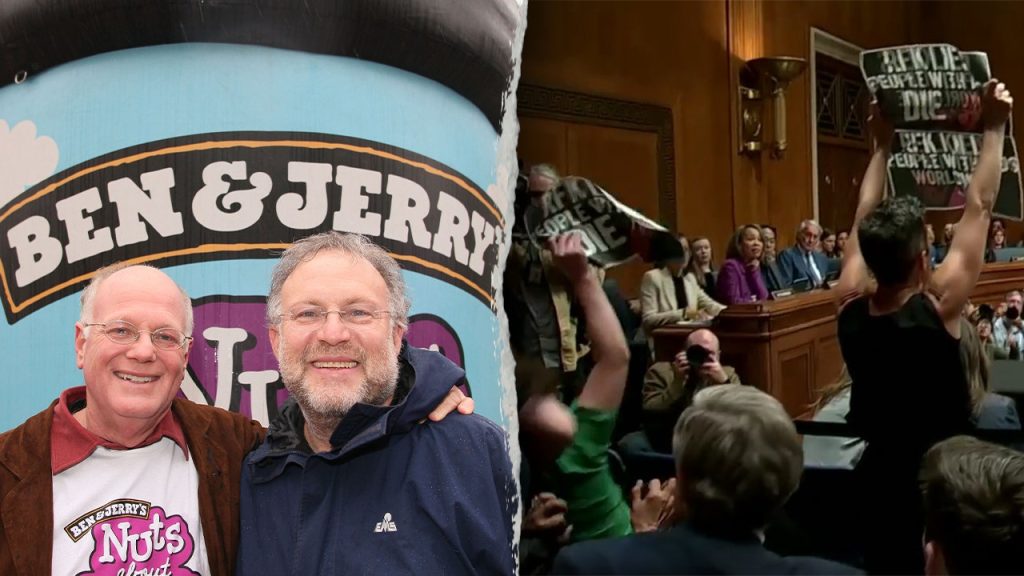On Wednesday afternoon, Ben Cohen, co-founder of the renowned ice cream brand Ben & Jerry’s, faced arrest during a Senate hearing featuring Health and Human Services Secretary Robert F. Kennedy Jr.. Joined by a group of protesters, Cohen interrupted the session by accusing Kennedy of “killing people with hate,” leading to a significant disruption. The United States Capitol Police confirmed that Cohen was arrested along with six others, although the specific charges varied among the individuals involved in the protest.
| Article Subheadings |
|---|
| 1) Context of the Hearing |
| 2) The Protest and Arrests |
| 3) An Ongoing Activism Journey |
| 4) Public Reactions to the Disruption |
| 5) Ben & Jerry’s Commitment to Activism |
Context of the Hearing
The Senate hearing where the disruption occurred was convened to discuss critical health-related policies overseen by the Department of Health and Human Services. This particular session took place in a highly charged political environment, with participants focused largely on the ongoing challenges surrounding public health and policy implementation. The committee, chaired by Sen. Bill Cassidy from Louisiana, was reviewing a series of healthcare measures expected to influence millions of Americans. The presence of high-profile attendees, including Secretary Kennedy, drew significant attention, prompting the gathering of advocates and protesters.
The Protest and Arrests
As Secretary Kennedy began his opening statement, a group of protesters, including Cohen, disrupted the proceedings by shouting phrases such as “RFK kills people with hate!” This protest escalated as the participants continued to chant in unison, leading to chaos in the hearing room. Capitol Police intervened, escorting individuals from the premises. Cohen faced charges of obstruction during this incident, while others were cited for resisting arrest or assaulting officers. Although the total number of arrests reached seven, the specific legal ramifications for each individual remain unclear.
An Ongoing Activism Journey
Cohen is no stranger to protests, having participated in various demonstrations throughout his career as an activist. In 2023, he was arrested outside the Department of Homeland Security while protesting the detention of journalist Julian Assange. His actions reflect a long-standing commitment to advocacy, particularly around issues related to social justice, human rights, and governmental accountability. Such arrests have become emblematic of his activism, serving as a testament to his dedication to make his voice heard on pressing matters.
Public Reactions to the Disruption
The disruption prompted immediate reactions from both audience members and committee members. Several attendees expressed discontent, interrupting the procedure with their own remarks. Chairperson Cassidy paused the hearing to address the situation, ultimately attempting to restore order in the room. His remarks, including the quip “That was a made-for-C-SPAN moment,” showcased a mix of irritation and humor in response to the chaotic atmosphere. Meanwhile, many observers on social media discussed the protest’s implications, underscoring the wider debate over civil disobedience as a means of pursuing political change.
Ben & Jerry’s Commitment to Activism
Founded in 1978, Ben & Jerry’s has built a reputation for its left-leaning advocacy and commitment to social justice issues. Throughout the years, the company has maintained its dedication to various causes, even after becoming owned by Unilever in 2000. Notably, the brand made headlines in 2021 when it announced its decision to cease sales in the West Bank, labeling the area as “Occupied Palestinian Territory.” Such moves exemplify the company’s overarching strategy to engage with complex social issues, often aligning itself with progressive values, much to the chagrin of some political opponents.
| No. | Key Points |
|---|---|
| 1 | Ben Cohen was arrested during a Senate hearing for disrupting proceedings. |
| 2 | The protest involved multiple people shouting accusatory chants against Secretary Kennedy. |
| 3 | Cohen’s activism has a long history, with previous arrests tied to significant issues. |
| 4 | Public reactions to the disruption revealed a mix of disappointment and amusement among attendees. |
| 5 | Ben & Jerry’s has a track record of social activism, reflecting its founders’ beliefs. |
Summary
The recent arrest of Ben Cohen during a Senate hearing underscores the intersection of political discourse and activism in today’s charged political climate. As Cohen continues to use his platform to advocate for various causes, his actions have reignited discussions regarding the effectiveness of civil disobedience. This incident not only highlights the tensions surrounding public health policies but also emphasizes the long-standing tradition of activism ingrained in the fabric of Ben & Jerry’s brand identity.
Frequently Asked Questions
Question: Why was Ben Cohen arrested?
Ben Cohen was arrested for obstructing a Senate hearing, where he participated in a protest against Health and Human Services Secretary Robert F. Kennedy Jr., accusing him of promoting harmful agendas.
Question: What were the protesters chanting during the hearing?
The protesters, including Cohen, yelled that “RFK kills people with hate,” disrupting the opening statement of Secretary Kennedy.
Question: What is Ben & Jerry’s stance on social issues?
Ben & Jerry’s has a long history of advocating for progressive values and social justice, evidenced by their various campaigns and public stands on issues like racial equality and climate change.


